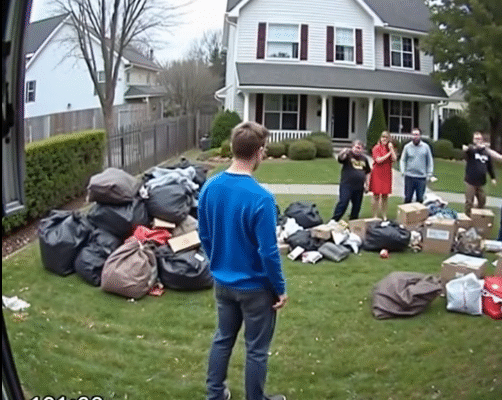A Father’s Final Days
When Dad’s illness worsened, he moved into hospice. I visited him often, reassuring him that everything would be okay. Emma, now in college, was frequently away. Mom seemed indifferent, living her life while Dad’s condition weighed on the household.
As Dad’s time dwindled, he asked for forgiveness, tears in his eyes. I forgave him, hoping it would bring him peace.
The Funeral and Hidden Motives
The funeral was somber. Distant relatives offered condolences, but I noticed their eyes on the estate. Whispers about the house’s ownership began circulating as soon as the ceremony ended. I listened silently, observing their greed.
The next day, I returned to collect some of Dad’s personal effects. As I approached, I saw my belongings scattered across the lawn—old books, clothes, and childhood memorabilia. Mom stood in the doorway, arms crossed, Emma at her side.
“This house is ours!” Mom declared. “You have no right here.”
I didn’t argue. I walked away, letting them savor their false triumph. I had seen this coming. They assumed Dad’s possessions were theirs by default.
The Will’s Revelation
A week later, the family gathered for the reading of the will. The notary, a stern and meticulous man, began explaining Dad’s final wishes. Sentimental items went to Emma, small bequests to other relatives. Mom appeared confident, already planning their future in the house.
Then came the shocking twist.
“The house is not listed in the will,” the notary announced. Confusion rippled through the room. “Because,” he continued, “the house was transferred to Sheila months before Mr. Johnson passed.”
Mom’s composure shattered. Emma looked bewildered. “This must be a mistake,” Mom stammered.
“No mistake,” I said, breaking my silence. “Dad sold me the house to clear debts and keep it in the family. I honored his wish.”
Reclaiming Dignity
Mom’s fury was palpable. Emma’s eyes shifted, a mixture of surprise and newfound respect. They realized I was no longer the overlooked child. I held the power, and they recognized it.
“I’m not throwing you out,” I said softly. “You can stay. But this isn’t about revenge. I want our family to heal—even if it’s only a distant hope.”
Mom’s eyes brimmed with tears—complex emotions, not gratitude. Emma approached hesitantly. “Thank you,” she whispered.
In that moment, I understood I had gained something far more valuable than the house: my dignity and the power of choice. I had redefined my place in a family that once ignored me, proving that strength and grace can prevail over bitterness and spite.
